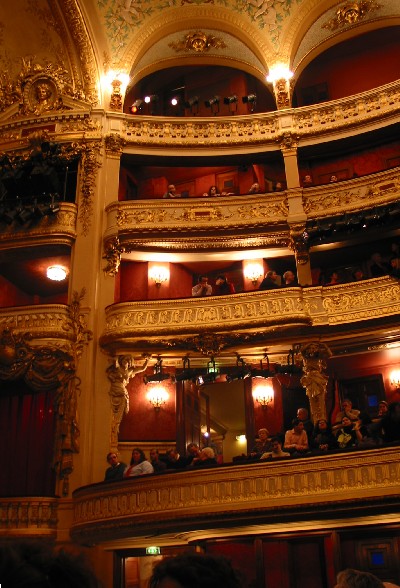La Vie Parisienne
Opéra Comique, Théâtre Musical Populaire. 5 rue Favart 75002 Paris. 2nd arr.
written by Jacques Offenbach, directed by Jérôme Savary
 La Vie Parisienne is a charming, comic operetta of 19th century Paris. The story begins with two men, Raoul de Gardefeu and Bobinet, waiting at Saint-Lazare for the arrival of Metalla, with whom they are both in love. When Metalla does appear, she is in the arms of an older and richer man. Scorned, the two men resolve to seek out instead more cultured ladies. As Bobinet rushes off to start his hunt for a “femme du monde,” Raoul encounters an old friend, Joseph, who is waiting to guide a wealthy Swedish baron and his wife around Paris. When the couple arrives, Raoul thinks the baroness is exactly the kind of lady he is looking for, and he pays Joseph to take his place as the Swedes’ guide.
La Vie Parisienne is a charming, comic operetta of 19th century Paris. The story begins with two men, Raoul de Gardefeu and Bobinet, waiting at Saint-Lazare for the arrival of Metalla, with whom they are both in love. When Metalla does appear, she is in the arms of an older and richer man. Scorned, the two men resolve to seek out instead more cultured ladies. As Bobinet rushes off to start his hunt for a “femme du monde,” Raoul encounters an old friend, Joseph, who is waiting to guide a wealthy Swedish baron and his wife around Paris. When the couple arrives, Raoul thinks the baroness is exactly the kind of lady he is looking for, and he pays Joseph to take his place as the Swedes’ guide.
Raoul takes the couple back to his own house and manages to convince them they are actually in an annex of the Grand-Hotel. Coincidentally, the baron enquires about Metalla herself, whom he has heard about from some of his Swedish friends. As he is speaking, Metalla shows up to apologize to Raoul, who turns her away. Raoul then makes arrangements to get rid of the baron so that he can spend more time with the baroness. He and Bobinet devise a plan to send the baron to a fake dinner party that will be attended by some of their neighbors disguised as persons of high rank.
 |
Some interior shots of the Opéra Comique.
Bobinet, disguised absurdly as an admiral of the Swiss navy, plays the host of this party at his aunt’s house. As the “guests” arrive, each is more ridiculous than the last, raising the baron’s suspicions. However, Pauline, Bobinet’s chamber lady, disguised as the flirtatious and enchanting wife of the admiral, soon dispels his doubts. Once the champagne starts flowing, the party turns into a wild cancan.
Meanwhile, Raoul is hard at work on winning over the baroness. Before he gets too far, Metalla once again rolls around and informs the baroness of Raoul’s deception. Word also reaches the baron, who goes to forget his troubles among Paris’ many brothels. On the streets, he runs into Metalla. She presents him with quite a lovely lady: his own wife, wearing a mask so she won’t be recognized. Raoul and Bobinet, searching for the baroness, find the Swedish nobles, and have no choice but to explain their whole scheme. In the end, the baron decides that he did indeed have a grand time in the city, and forgives the two conniving playboys. With everyone satisfied, the whole cast celebrates with another raucous cancan.
Even though it was written in 1866, La Vie Parisienne remains entertaining. The gags never cease, the characters are over the top, and, for good measure, the whole show is quite risqué. Although surely just a parody of Parisian life in the 1860s, the operetta manages to give a fascinating glimpse into this bygone era.
